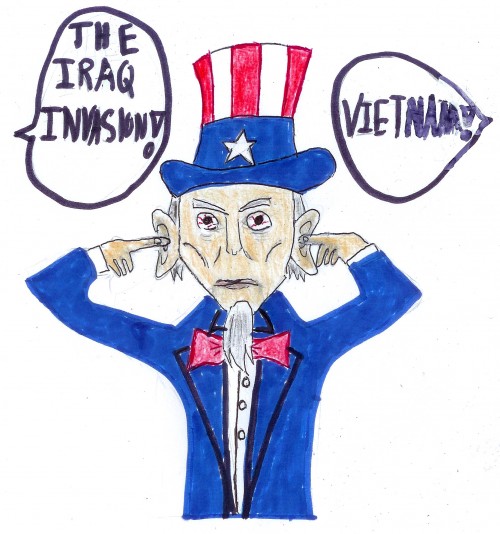
Last month, an Oklahoma legislative committee approved a bill that would severely cut funding to the teaching of AP U.S. History in public schools. Representative Dan Fisher introduced the bill on the grounds that the newly-revised curriculum emphasizes “What is bad about America” and doesn’t teach “American exceptionalism.”
It’s a complaint touted by mostly conservative state legislatures and in recent months has caused some to call for a ban on all AP courses. Fisher asserts that the current APUSH course focuses too heavily on events that portray the US in a negative light such as slavery, the Native American genocide and the internment of Japanese Americans. Noting its lacking coverage of “American Exceptionalism”, he also mentioned that it does not focus enough on the teaching of how great or virtuous America is.
American Exceptionalism is the belief that America’s ideals of freedom and equality are so inherently great and unique that it makes it qualitatively different from other nations. Although this does not imply superiority itself, many citizens and politicians have come to believe that the U.S. is a country whose benevolence is great. They view our nation as one that stands up for freedom and spreads democracy around the world
From this line of thinking it is easy to assert that most of what the U.S. does in the world is justified because of its supposedly righteous agenda. This raises a bit of a moral conundrum: if we are defending freedom, aren’t we allowed to do other things that might be immoral under normal circumstances?
Some believe that no matter what the U.S. does, what sort of injustice is committed or what carnage results, we always mean well because of our inherent greatness. Sure, our leaders may make some mistakes, but our intentions are noble because our ideals are noble. Therefore, all of the acts we commit, even ruthless ones, may be justified.
If we violate international law by torturing or even executing Afghan citizens without charges, there must be some sound reason. But when another nation, like Iran, violates the same international law under the same pretenses, they must be brought to justice quickly because they are not virtuous like us. They do not represent the noble ideals or intentions that America, of course, represents.
This perspective has regrettably insulated our country from the very morals that we are supposed to be upholding.
Our “them versus us” mentality has been outlined numerous times in the past, the most salient of which involved the a U.S. government statement that was delivered to the U.N. when it was under investigation for the war crimes committed in Yugoslavia. U.S. officials asserted the president’s right to violate international law if he believed it was necessary for the defense of America or its allies. They made sure to stress that this privilege would not extend to other nations that were not like the U.S.
Whether or not the U.S. is a benevolent or a ruthless nation is a question that must be answered with an inquiry into the U.S. government’s actions but also with a careful analysis of the beliefs and motives behind them.
Here is a quick recap of America’s activity in recent decades.
1.Supported dictators, drug lords, and terrorists in over 35 countries.
2.Continuously dropped bombs on innocent civilians of 14 Islamic countries
3. Overthrew 7 democratically elected governments around the world
4. Was one of the leaders in torture around the world
These statistics are indeed exceptional. No other country comes close.
But the actions of the U.S. government must also be judged by the underlying motives behind them. The essential question that must be answered is whether America did what it did believing it was beneficial for the world or for an alternative purposes.
One could make a good case that a lot of acts such as overthrowing foreign governments were done with humanitarian purposes in mind, which is true.
However, the vast majority of these acts were also committed to fulfill economic interests. The U.S. did not invade and destabilize Guatemala, support Suharto’s murderous regime in Indonesia, or institute a dictatorship in Iran for freedom or even its own defense. It did all of these things because Nicaragua, Indonesia, and Iran all previously refused to be client states, meaning they all previously refused to engage in trade with it.
Simply, it was economically favorable to assassinate democratic or populist leaders and put dictators in power that agreed to fork over natural resources.
The conduct of U.S. foreign policy has been determined largely by its relative power in the international community. By focusing on their supposedly exceptional qualities, people like Fisher blind themselves to the fact that our country operates in the same way as the majority of other extremely powerful countries on this planet: doing what is best for itself and exploiting power for economic means if necessary.
The problem is that people like Fisher have certain basic assumptions about the U.S. and its foreign policy that is the very foundation of their belief system and therefore requires great strength to sway. This unchallenged faith in America’s actions makes it harder for him to understand why others are less enthusiastic about U.S. dominance or American Exceptionalism.
This is the reason why people like Fisher attempt to suppress history when it paints an unfavorable picture, a picture that they themselves know is horrible. They know that if history reveals itself clearly, they will be forced to question everything they stand for.
It is important that we hold true to the concept of an unbiased and well-rounded teaching of our nation’s history. Its teaching must not sugar coat our failures or try to emphasize that we are somehow great no matter what we do. For history itself serves as a reminder of the dangers of blind nationalism.







